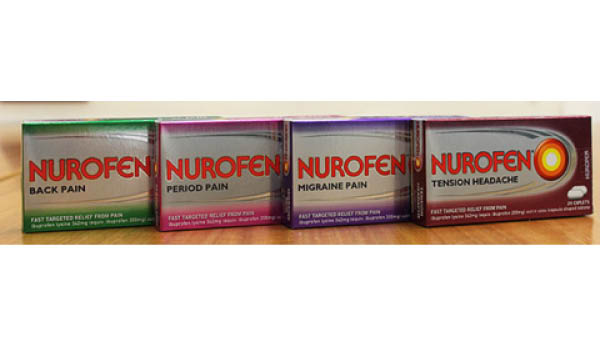Reckitt Benckiser will remove its Nurofen Specific Pain products from retail shelves over the next three months after the Federal Court found its claims of targeting specific areas of pain, such as back pain and migraine pain, to be misleading.
The Federal Court ruled Reckitt Benckiser engaged in misleading conduct in contravention of the Australian Consumer Law by representing that its Nurofen Specific Pain products were each formulated to treat a specific type of pain, however, each product contains the same active ingredient, ibuprofen lysine 342mg, as other Nurofen products.
The Australian Competition and Consumer Commission (ACCC) launched court proceedings against Reckitt Benckiser and its range of Nurofen Specific Pain products, including Nurofen Back Pain, Nurofen Period Pain, Nurofen Migraine Pain and Nurofen Tension Headache, earlier this year over its advertising.
Reckitt Benckiser has since admitted that it had engaged in the contravening conduct and has consented to the orders made by the court. It has agreed that all current Nurofen specific-pain packaging will be removed from retail shelves and replaced with interim packaging, agreed with the ACCC, which will clearly disclose to consumers that the products are equally effective for other forms of pain. The court has also ordered the company to publish website and newspaper corrective notices, implement a consumer protection compliance program, and pay the ACCC’s costs.
Nurofen spokesperson, Montse Pena, said the company did not set out to mislead consumers.
“The Nurofen specific pain range was launched with an intention to help consumers navigate their pain relief options, particularly within the grocery environment where there is no healthcare professional to assist decision making,”Pena said.
“Nurofen did not set out to mislead consumers. Nurofen has co-operated with the ACCC in relation to these proceedings and will fully comply with the court order made today.”
ACCC chairman, Rod Sims, said the ACCC launched proceedings because it was concerned that consumers may have purchased these products in the belief that they specifically treated a certain type of pain, based on the representations on the packaging, when this was not the case.
“Truth in advertising and consumer issues in the health and medical sectors are priority areas for the ACCC, to ensure that consumers are given accurate information when making their purchasing decisions,” Sims said.
“Any representations which are difficult for a consumer to test will face greater scrutiny from the ACCC,” Sims said.
“The retail price of the Nurofen Specific Pain Products was significantly higher than that of other comparable analgesic products which also act as general pain relievers. Price sampling conducted by the ACCC before the proceedings were commenced indicated that the Nurofen Specific Pain products were being sold at retail prices almost double that of Nurofen’s standard ibuprofen products and the general pain relief products of its competitors.”
A hearing on penalty will be held on a date to be fixed by the court.

